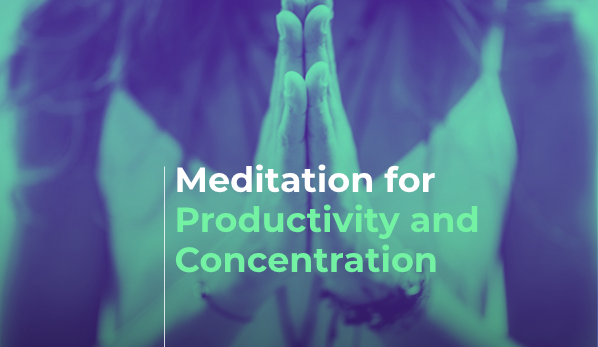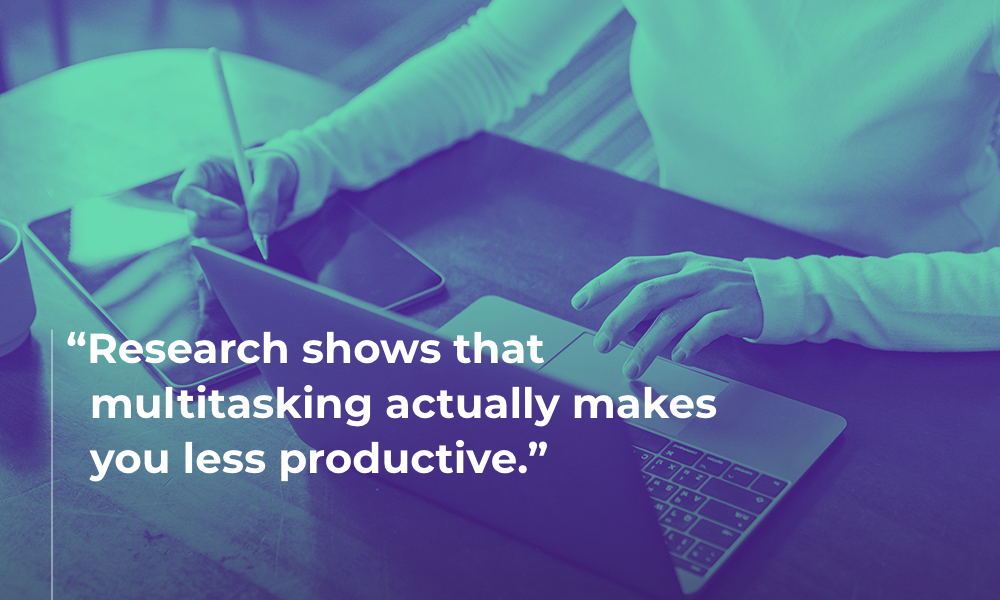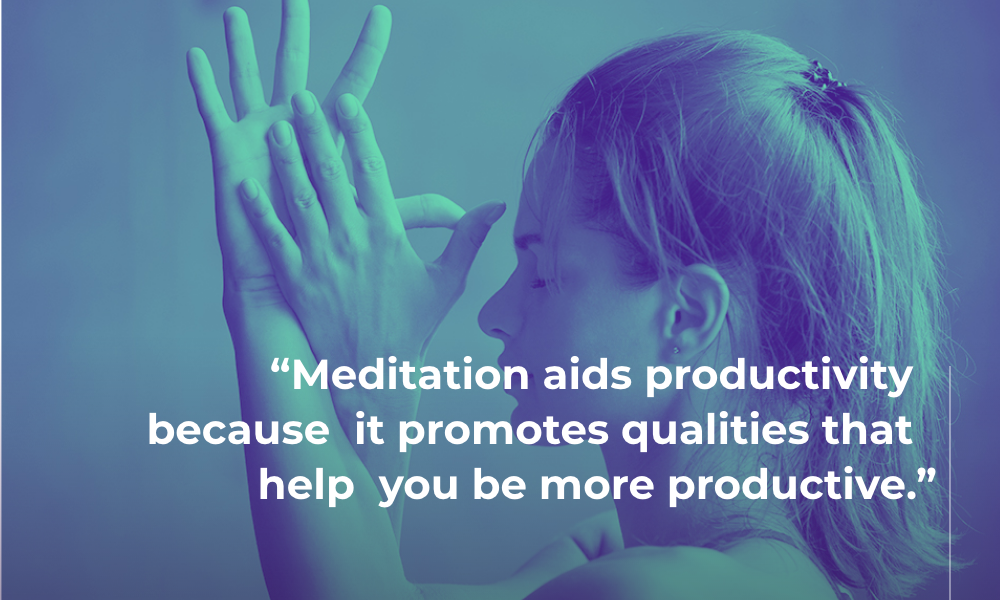You’re likely a very talented person. But it takes more than raw talent to succeed. To be successful, you must funnel your talent into productive actions. Otherwise, your talent will get you nowhere.
Productivity and concentration are two critical skills that talented high performers need to have. But obstacles in life can cause our productivity to suffer. If you’d like to up your performance in these areas, we recommend meditation for productivity and concentration.
What is Productivity?
Let’s start with the basics. Technically speaking, productivity measures the ratio of your input to your output. Simply put, productivity is the ability to get all your work done efficiently.
What is Concentration?
Concentration is an essential part of productivity. It’s the ability to focus all your attention on the task at hand. But concentration can be difficult, with a wide range of internal and external distractions thrown your way. And that can make your productivity suffer.
Obstacles to Productivity
There are quite a few obstacles to productivity. Some of them are obvious, like procrastination. And others seem like they’re helpful when they’re actually not, like multitasking. Here are a few of the obstacles to productivity that you may encounter:
1. Attempting To Multitask
What if we told you that you get more done in less time when you don’t multitask? Multitasking, or trying to do more than one task at once, can seem like a great way to be productive. However, research shows that multitasking actually makes you less productive. You’ll find that you finish a project more efficiently when you direct all your attention to it.
2. Lack of Communication
Failing to communicate your expectations leads to a loss in productivity. Without a clear understanding of the requirements, mistakes get made and projects need to be re-done. Take the time to write out (or verbally state) your expectations clearly before the project begins. And have your clients do the same.
3. Technological Distractions
This is a huge obstacle for many people. Tech distractions, like email and social media, can take up your entire day if you let them. Limit yourself to only the technology you need for your project, and turn the rest off.
4. Having Too Many Goals
Creating a long list of goals feels ambitious and exciting. But it can become overwhelming and cause you to give up. Instead, create a couple of goals and see them through to completion. Then, you can make more.
5. An Inability To Concentrate
Studies show that our attention spans are narrower now than they ever were before. We’re used to our media holding our attention for just a few seconds before intriguing us with something new. No wonder we have trouble focusing on lengthy projects! To counteract this, we have to train our attention, and meditation helps us do that.
6. Procrastination
Procrastination, or delaying work on a project, is one of the most common hurdles to productivity. However, you can take heart in knowing that procrastination isn’t usually a result of being a lazy person. Often, procrastination is actually an ego defense mechanism. If you don’t take action, it’s easy to tell yourself that you would have succeeded if you tried. This leads us to…
7. Perfectionism
On the surface, perfectionism may seem like a good trait, but it’s dangerous for your productivity. If you’re obsessed with making a project flawless, you’ll spend far too long on it. Or you’ll become overwhelmed and start procrastinating.
Stephen Guise, author of How to be an Imperfectionist, says, “A common, false assumption is that aiming for perfection gets you closer to it. The opposite is true: Embracing imperfection will bring you closer to perfection than a perfectionist mindset will.”
It’s crucial to aim for high-quality work, but it’s equally important to accept minor imperfections. Meditation can help you cultivate this acceptance.
How Meditation Can Improve Your Productivity
Here are a few ways that you can use mindfulness and meditation to help with productivity.
Decreases Negative Reactions
When you’re in a negative headspace, it can affect your productivity. You spend time dwelling instead of getting work done. But meditation can help you release those negative emotions. Studies show that a regular mindfulness meditation practice (for as little as seven weeks) helps you better manage negative emotions. This can lead to inner peace and a successful workday.
Enhances Concentration
As we mentioned earlier, meditation can help you concentrate. This is because meditation is all about training your awareness. When you spend time following your breath in and out, you cultivate a sustained awareness. And a sustained awareness enables your ability to concentrate. You can bring that concentration with you into all parts of your professional and personal life.
Increases Focus
Meditation improves focus. In fact, one study found that participants who did eight weeks of meditation stayed more focused on their task than their counterparts who didn’t meditate. Plus, better focus bolsters your decision-making skills, which are essential for getting things done.
Reduces Stress
A major obstacle to productivity is stress. It’s a natural byproduct of having a lot of projects. A little bit of stress can actually be good—it helps you stay alert and focused on your project. However, stress can quickly cross the threshold from helpful into harmful and distracting. That’s why it’s crucial to know how to reign it in. Mindfulness meditation can help here. It’s proven to reduce the stress levels of regular meditators.
Cultivates Mindfulness
Finally, meditation helps you cultivate mindfulness, an essential trait for staying focused.Mindfulness occurs when you direct all your awareness to the present moment. It’s a natural byproduct of regular meditation. When you’re mindful and in the present moment, you’re able to focus on your task and get your work done efficiently.
How to Meditate for Productivity
Meditation aids productivity because it promotes qualities that help you be more productive.These qualities include sustained attention and emotional agility. Mindfulness meditation is like going to the gym to build your focus muscle, while visualization and other types of guided meditations found in
Primed Mind help you generate specific skills and mental states that boost your productivity.
Here’s how to prepare for your meditation session:
- Set aside a time of day to meditate. Having regular meditation time blocked on your schedule makes you more likely to do it. Plus, meditating regularly helps you build the habit. So set a time and stick to it.
- Eliminate distractions. Do your best to remove anything (like a buzzing phone or cluttered area) that might distract you while you meditate. If you can, ask anyone near you to give you silence during your meditation session.
- Wear comfortable clothing. You can meditate wearing anything, but comfortable clothing makes the process more enjoyable. So try to wear something loose that won’t distract you while you sit.
- Choose the type of meditation you plan to do. There are many types of meditation, and all of them promote a sense of awareness. But a basic mindfulness meditation works well for productivity.
- Begin meditating. To practice a mindfulness meditation session, draw your attention to your breath. Follow each inhale and exhale as they arrive. When you notice your mind wandering, acknowledge it and then return to your breath. When using Primed Mind, simply hit play and let our coaches guide you to a productive mindset.
Primed Mind has guided meditation sessions designed specifically to help you optimize your time and get organized.
A Guided Meditation for Productivity and Concentration
Try this meditation on controlling your mindset to boost your productivity and concentration. If you like it, we challenge you to do it for five days in a row. The results may surprise you!
More Ways to Be Productive
Meditation for productivity works best when you’re also taking other measures to improve your productivity. Here are a few tips to help you:
- Keep devices turned off until you need them
- Block distracting websites (like Twitter, LinkedIn, and Amazon)
- Use a time management method like The Pomodoro Technique, which suggests working in short bursts to accomplish goals
- Take regular breaks
- Do your best to avoid multitasking (for example, if you’re writing an email, don’t listen to a podcast at the same time)
- Take good care of your health by eating regular, balanced meals, getting seven to nine hours of sleep each night, and performing regular exercise
Frequently Asked Questions About Meditation for Productivity
If you’re new to meditation, you may have questions. Here are some that we hear frequently:
Is A 20-Minute Meditation Session Long Enough?
This is like asking if drinking a certain amount of water is enough. The answer is: it could be; it just depends! Your needs fluctuate from day-to-day, and it’s okay to modify your meditation practice accordingly. You can see benefits from meditation by practicing for just a few minutes per day, and that’s what we recommend starting with if you’re a beginner.
What Should I Focus on While Meditating?
You just want to sit and be aware of your breath. If it’s your first time meditating, you may want to start with a guided meditation app. An app will help you direct your attention, and it will get you in the right headspace to meditate. Or, you can practice a mindfulness meditation by drawing all your awareness to your breath.
How Do You Meditate Daily?
The best way to make meditation a daily habit is to add it to your schedule. Treat it like a firm obligation, the same way you’d treat a meeting with a client or your child’s parent-teacher conference.
It also helps to have a set time of day and a specific place to meditate. Many people choose an unused corner of their bedroom or office. You can place a chair or meditation cushion there, so it’s all ready to go. After a while, you may notice that the space itself promotes a sense of calm.
Using Primed Mind to Up Your Productivity Game
We all need to learn how to lock in our focus and be more productive, but this is especially true for high performers. Some might even say that staying productive and focused is the most important ability that high performers need to have. A regular meditation practice helps you foster the skills necessary to do that. Skills like emotional resilience, mindfulness, concentration, and even relaxation.
Plus, it contributes to your overall well-being. With meditation, there is no downside, only a more focused and more productive outcome.
Primed Mind is a meditation app designed to help you generate the mindsets you need to be successful. Our Primers can help you narrow your focus on specific goals, and help you get back on track when your focus starts to waiver. Try a session today and see how your productivity flourishes.





